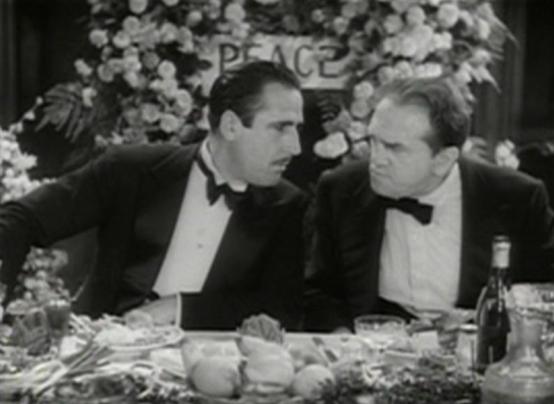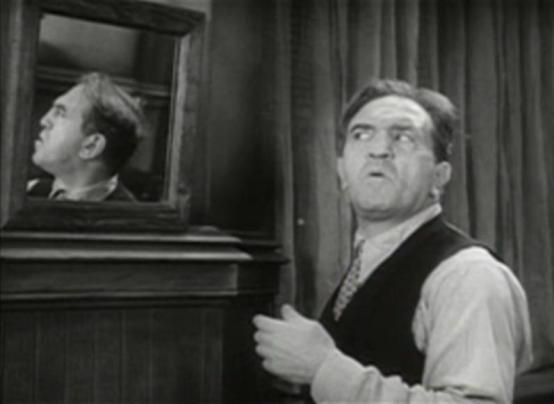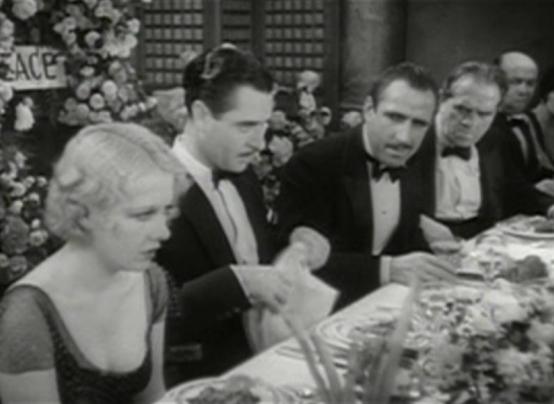I’ll admit that John Gilbert appeared in better talkies, but I don’t enjoy any of them more than I do Gentleman’s Fate. That statement says more for Gilbert’s speaking roles than most histories do, but the actor’s later work continues to grow in popularity as it becomes more easily available for viewing. Several of my past posts have proved my affinity for early gangster and crime films, but Gentleman’s Fate is a bit of a flop as a mobster movie. What I enjoy most is the interaction between two very different actors, former idol of the silent screen Gilbert and the gruff character actor Louis Wolheim, who had died by the time Gentleman’s Fate was released.
I’m especially attracted to the portrayal by Wolheim, who gives voice to the mobster type he previously played to great effect silently in The Racket (1928), but it is his character’s relationship with Gilbert’s, that turns out to be the heart of this movie.
In November 1930, MGM borrowed Mervyn LeRoy to direct Gentleman’s Fate shortly after he had completed work on Little Caesar for his home studio, Warner Bros. While Little Caesar focused on the rise of one megalomaniac crime lord, Gentleman’s Fate used a gangland background to tell the story of two very different brothers separated since birth, but brought together by their father’s deathbed wish to see his youngest son again.
Jack Thomas (John Gilbert) is a dashing young playboy ready to settle down with the girl he loves (Leila Hyams) when a phone call from his guardian (Paul Porcasi) changes his life.
Jack discovers that he’s not Jack Thomas, but Giacomo Tomasulo and that his father, presumed long dead, was still alive but clinging to life at the Ritzi Hotel with hopes of being reunited with his son before the bullet in him kills him.
 His guardian warns Jack that there is even more to his story, but that he’ll have to find it out for himself. A dismayed Jack arrives at the Ritzi and meets older brother, Frank Tomasulo (Louis Wolheim), who bluntly informs Jack, or Giacomo, that the family business is the illegal liquor business: “We run a string of booze trucks from Montreal to here,” with here being Jersey City. Each man can see that they have nothing in common with their brother and Frank rather decently offers Giacomo a buyout of $50,000, for starters, to go off and marry his “goil” and live his own life. Frank’s only concern is that Giacomo treat their father right and fulfill hopes for a happy reunion. Giacomo, our gentleman, had no other intention.
His guardian warns Jack that there is even more to his story, but that he’ll have to find it out for himself. A dismayed Jack arrives at the Ritzi and meets older brother, Frank Tomasulo (Louis Wolheim), who bluntly informs Jack, or Giacomo, that the family business is the illegal liquor business: “We run a string of booze trucks from Montreal to here,” with here being Jersey City. Each man can see that they have nothing in common with their brother and Frank rather decently offers Giacomo a buyout of $50,000, for starters, to go off and marry his “goil” and live his own life. Frank’s only concern is that Giacomo treat their father right and fulfill hopes for a happy reunion. Giacomo, our gentleman, had no other intention.
The meeting between father and son goes well and Papa Tomasulo (Frank Reicher) makes a gift of an emerald necklace for Giacomo to give to his fiancé. Marjorie is thrilled with the necklace and doesn’t balk too very much when Jack explains that he’ll have to go out of town for a week. Frank has requested he come stay at the Ritzi in case their father calls for him. Jack keeps his newly discovered background from Marjorie with hopes that it will all blow over with his father’s imminent death and he can return to her and the life they have planned. Jack leaves Marjorie puzzled when he gives her an emergency phone number with instructions to ask for Giacomo Tomasulo if she has to call.
Marjorie is forced to call when she discovers that the necklace Jack had given her was stolen from a society acquaintance. Brother Frank has Marjorie come to them and explains to Giacomo that he has to take the fall for stealing the necklace. “If you don’t take the rap, your old man’s going to take it.”
Jack doesn’t realize yet, but this spells the end of his relationship with Marjorie in addition to the prison sentence he faces for taking the rap. Giacomo’s sentence is shortened to just ten days because of Frank’s behind-the-scenes maneuvering but he returns to the Ritzi to find that his father has died during the time of his incarceration. He’s even missed the funeral.
Up until now Wolheim’s Frank appears to be the villain of Gentleman’s Fate, but Giacomo has returned to have a promised showdown with him and the brawl winds up earning big brother’s respect.
“You sure can put up a fight, boy,” Frank tells him. “I guess maybe gentleman ain’t so bad. I just never understood one before, that’s all.”
“You’re not so bad yourself,” Giacomo replies.
Frank delivers a note from Marjorie to Giacomo and the news isn’t good. Overwhelmed and confused Jack Thomas seals his fate as Giacomo Tomasulo by agreeing to come into the family business with Frank.
Frank offers him the Canadian end of the business because, “You’ve got a front and you talk like a gentleman.”
“Yeah, like a gentleman,” Giacomo replies.
“Quit that,” says Frank, reassuring his brother. “You’re a gentleman now and you always will be one.”
Gentleman’s Fate distinguishes itself with the more complicated than expected relationship between the brothers. Gilbert’s Giacomo never entirely loses Jack Thomas as he dips into the underworld, leaving Wolheim’s Frank the more interesting character. Frank is a brute, but despite exterior appearances he is never anything but supportive of Giacomo as a family member, even before younger brother earned his respect during their fight. While Frank forces Giacomo to take a fall over the emerald necklace, he does so only to protect the true guilty party, their dying father. Once their father is gone and Giacomo has done the family right by taking blame for the theft, Frank is entirely devoted to Giacomo.
While the dynamic between the brothers is what carries Gentleman’s Fate the movie suffers from an ineffectual rival, with John Miljan’s Florio never seeming to stand a chance against the Tomasulo family, and an awkward ending that leaves viewers on a down note and commits the sin of moralizing while doing so.
An interesting romance buds towards the end of the film when rebounding Giacomo falls for Ruth Corrigan (Anita Page), a common gun moll by virtue of environment but in reality an insecure young woman who is quickly swept off her feet by Giacomo. His initial attraction is simply Ruth’s head of blonde hair reminding him of lost love Marjorie.
Gilbert’s daughter, Leatrice Gilbert Fountain, trashed Gentleman’s Fate in her 1985 biography of her father, Dark Star, but it has gained in reputation in recent years just by virtue of being seen. Fountain is a bit sensitive to select reviews and some of the tempered praise that she took as backhanded talk of a Gilbert comeback, implications being that the mighty had fallen. While I ran into a few negative reviews and, yes, even more articles referring to Gilbert’s difficulties in adjusting to sound films, I was pleasantly surprised to find just as much positive discussion of Gentleman’s Fate in the period press. Lavish praise came from top fan magazine, Photoplay, which gushed, “My, but we are happy again. This picture proves, to the nth degree, that Jack Gilbert needs only the right story and direction to have all his old appeal.” (54).
Additionally, Photoplay named the film one of its “Best Pictures of the Month” in that March 1931 issue, alongside titles such as Trader Horn and Chaplin’s City Lights. It also drew attention to both Gilbert and Louis Wolheim in naming them among the “Best Performances of the Month.”
Another fan magazine, New Movie Magazine was unimpressed. While they praised the work of Louis Wolheim they also took time to rip Gilbert with reviewer Frederick James Smith writing, “It is unpleasant to report that Gilbert continues to be colorless.” This, more than any negative appraisal of Gilbert’s voice, is a point I can understand, even if I disagree. Gilbert as Giacomo is at the disadvantage of Wolheim, who plays the far more colorful brother. While Giacomo commits actions which take him down the same path as Frank, the Gilbert character never cedes any of the manner that imbues him at the start of Gentleman’s Fate. He always remains the gentleman without any hint of deviousness. Gentleman aren’t very exciting by nature and thus the character lacks color, but Gilbert plays him fine.
Gentleman’s Fate was based on a story by Ursula Parrott, who had previously written the source material for MGM’s Norma Shearer-hit The Divorcee (1930). Parrott’s story was serialized in the March through July 1931 issues of Household magazine, thus hitting the newsstands at about the same time as the March 1931 release of the film.

Above: George Cooper and Marie Prevost serve as comedy relief in Gentleman’s Fate. Prevost had previously had a much larger role opposite Wolheim in 1928’s The Racket. For more about her check out The Marie Prevost Project at She Blogged by Night.
The film was made at a cost of $500,000 and realized a loss of $216,000 (Golden 225). If I understand those figures correctly, it would have shown a mild profit if not for Gilbert’s $250,000 per film salary.
While Downstairs (1932) is probably the best of the John Gilbert talkies, Gentleman’s Fate remains my favorite because of the Gilbert-Louis Wolheim tandem. When Gentleman’s Fate is a gangster movie it is a bit clumsy, but Gilbert and Wolheim provide a highlight in every scene they share. Anita Page is quite good as well, but the movie is more than halfway over before we get to meet her.
Gentleman’s Fate has never been released to home video. Screen captures on this page are taken from a past showing on TCM.
Sources
- Fountain, Leatrice Gilbert. Dark Star: The Untold Story of the Meteoric Rise and Fall of Legendary Silent Screen Star John Gilbert
New York: St. Martin’s Press, 1985.
- Golden, Eve. John Gilbert: The Last of the Silent Film Stars
. Lexington: University Press of Kentucky, 2013.
- Smith, Frederick James. “The Reviews.” New Movie Magazine Oct 1931: 76.
- ”The Shadow Stage.” Photoplay Mar 1931: 54-55.

For more about Gentleman’s Fate be sure to read Moira Finnie’s article at TCM.com.












Thanks for your reviews. I’ve recently watched “The Sin Ship” and “Gentlemen’s Fate” during their latest T.C.M showings. I enjoyed both and it was good to read your reviews after watching them. I agree with you about “Downstairs” being Gilbert’s best talkie (of the few I’ve seen). Like that movie, “Gentlemen’s Fate” made me sadder about his career sinking during the sound era. I’m always pleased by his performances and I think his thin, high voice was nice. It always sounds friendly and warm to me. I wish people hadn’t been so negative about it. I feel a little better after reading your positive words about Gilbert and those you’ve provided from other print sources at the time.
I’d seen Louis Wolheim before in “All Quiet on the Western Front” and “The Silver Horde”, but never really noticed him much (being distracted by other members of those casts) until recently. He stood out to me more with his starring roles in some movies played during T.C.M’s Mary Astor marathon (“Two Arabian Knights” and “The Sin Ship”). As someone who has just become interested in him, I appreciate your informative writing about the man and his career.
As a Gilbert fan, it’s cool to read the words of someone who appreciates his talkie performances like I do. I’ve been fond of your site for awhile because of all the neat vintage movie stuff on it. This is the first time I’ve read a review here and now I’m excited to read more. Keep up the good work!
Thanks for the kind words. Glad you were swayed to read some stuff after checking out the collectibles. When I started the site years ago I mainly posted to help sell the goods, but a few years back I really became addicted to posting the best quality reviews and articles that I could.
I wish we had more talkies for each Gilbert and Wolheim. While I’m sure had each man lived longer Wolheim would be better known than he is today, that is probably not true of Gilbert. That’s not a knock on John Gilbert, just recognition that much of his legacy today is boosted by the fascination surrounding his demise. Had he lived and kept on working, I doubt we’d have that.
I’d definitely recommend checking out Gilbert’s last movie too, if you can, The Captain Hates the Sea.
I think you make a fair point about Gilbert. I have to admit that a lot of the reason I’m so interested in him is the tragic way his life turned out. The reason I wanted to know about him in the first place is his connection to Greta Garbo (my favourite actress). Over time, I’ve come to appreciate Gilbert as more than just a great co-star for her and a significant positive influence on her career.
Perhaps Gilbert wouldn’t be as revered if he’d had a more normal life and career (I have a similar feeling about James Dean). Still, I think I’d have a lot of affection for Gilbert, no matter how his career turned out. I just find him so likable on screen and I appreciate how he helped Garbo get off to a good start in front of American audiences. I wish the two of them had lived happily ever after in real life.
As for Wolheim, after watching “The Sin Ship”, I think he might have grown into a considerable director. While the movie was a bit unrefined and not a classic by any means, I enjoyed many things about it. I can see a lot of potential in Wolheim the director based on what he did with his directorial debut.
I have seen “The Captain Hates The Sea” and it made me melancholy. I thought Gilbert’s performance was quite lovely, and really poignant because he was playing an alcoholic trying to get clean while he was struggling (and ultimately failing) to get over alcoholism in real life. I wish the movie had been better…I believe his performance was far superior to the material.
Like you said, the context of Gilbert’s death makes him much more interesting than he might have been otherwise. That movie also had an ending that I wish had happened in real life, with Gilbert being content despite his struggles because the right woman is supporting him. Thanks for replying so thoughtfully, it’s bittersweet to talk with another Gilbert fan like this.
Not to speak lightly of death, especially the more tragic ones, but while an early departure doesn’t guarantee immortality — see one of my pet stars, Dorothy Dell, or our pal Wolheim — a long life certainly seems to give us every opportunity to forget you.
I don’t think we need to look much further than the recent passings of titanic child stars Deanna Durbin and Shirley Temple to see that. Each of those women received some mainstream press coverage, but we’re just too many generations removed from the people who enjoyed their success first hand for the “general public” to care too much about their leaving us. Shirley didn’t even make the cover of the New York newspapers, and you had to dig back to the general obit section to find AP reports of Deanna’s death. Maybe I’m getting old fashioned talking about newspapers though.
It’s funny, I always think about the great character roles Wolheim would have played throughout the ’30s, but you could be right. While he seemed slightly sour on directing at that time, more years would have given him plenty of time to give it another shot.
“much of his legacy today is boosted by the fascination surrounding his demise”
When I read this, I thought about Richard Barthelmess just kind of slowly fading out, and then I scrolled down and sure enough you compare him to Richard Barthelmess.
I’ve seen all of GIlbert’s talkies except for “His Glorious Night” and most of them are just minor. They aren’t all terrible. “Downstairs” is outstanding, and “The Phantom of Paris” is pretty good, but they’re all minor. There were a lot of careers crashing at that time and it seems like after his first film was a flop and his second film was a flop (“Redemption”, and that one was complete garbage), the studio just gave up.
But really, look at Barthelmess. He didn’t have a studio boss that hated him. He had a huge hit right out of the gate with “The Dawn Patrol”. And within a couple of years he was done as a leading man. You’re quite right, Gilbert probably would have been doing character parts and then been forgotten.
Cliff,
First off! Welcome back! : )
You know, we’ve read all the articles implying ‘Talkies ruined John Gilbert’s career’!
Here we have Gentleman’s Fate and there are other examples of his films ‘after’ talkies came to be. He sounded find and I found his screen presence appealing, even more so than other silent actresses who’s careers carried over just find with much success.
Do you think there were other things at work that caused Gilbert’s career to hit the skids? The influence of ex girlfriends, studio big wigs or was her just tired of it all? I just don’t buy that his voice did him in. No evidence that would have been the case,
Anxious to get your opinion and another great review.
Page
Hey Page, thanks! Glad to be back in, though I’ve got to brainstorm a Blogathon topic yet–of course, the subject I absolutely did not want to win, won, but then I do make trips to the ’50s every so often anyway!
Oh, John Gilbert. You’ve got the voice, Mayer conspiracies and his daughter puts a lot of the blame on Lionel Barrymore’s directing his first two talkies. I’ll be honest, I haven’t seen his first two talkies, so I’m not at liberty to discuss them. What I will say is that I think it was probably a combination of factors along with the heavy weight of that $250k per movie salary. Now if the public didn’t like his first talkie and they didn’t like his second talkie, then man, we’ve got to keep paying this guy to cost us money? Now I know I like the ’30s movies I’ve seen him in, but if Gilbert seems to have at the very least lost some momentum and only making two movies a year it would have had to have been hard to regain it, no?
Personally, I’ve got no problem with his voice and agree, good presence. As mentioned in my reply above, had he lived I assume this would have all smoothed out over time. Do I think he’d have ever been a mega-star again? No, but I think he would have had a career. The legacy just gets compounded over time by his early death, I mean, how come we’re not sitting around wondering what happened to Richard Barthelmess or Conrad Nagel? They lived and they worked, just not at the level they had earlier.
Terrific post and insightful comments. I agree – I saw it more as a
pretty solid movie than as a gangster movie. You read a lot about
the poorness of John Gilbert’s sound films but the more I see, the
more I think if he had just been given a go and not been burdened
with that huge salary etc, he may have developed into a breezy leading
man. I thought he had a very pleasing voice and
worked wonderfully with Louis Wolheim. Another one I liked was “The
Phantom of Paris” – it was just a terrific story.
re John Barrymore’s direction, I am sure I read, I think it was Barbara
Stanwyck saying, he directed her in “Ten Cents a Dance” (?? not sure
which one, but it was one of her very early films), the painkillers he
was on for his illness, she said most of the time the actors directed
themselves!!
The person I really think was short changed was Anita Page. Thought
she was just terrific in this movie and had the makings of an excellent
young character actress. She garnered a lot of fanfare for “Our Dancing
Daughters” and supposedly had the film world at her feet but who knew
in a couple of years she would be way down the cast list in “The Easiest
Way”. “Gentleman’s Fate” showed she should have had a bigger career.
Haven’t mentioned Wolheim but I just love that big lug!! He could
recite the phone book and I’d tune in.
Diane, you always pick out my favorites to comment upon, so glad you’re reading these! I think Anita Page is more personality than talent, but when that personality clicks she’s wonderful! It clicks here and I definitely wanted more. Love her in her small role in Skyscraper Souls too, though that’s one of my favorite movies of the era and there isn’t much I don’t love about it! The Phantom of Paris is very good, though Gentleman’s Fate is my favorite Gilbert talkie, followed by Downstairs. You know I’m right there with you as founders of the 21st Century edition of the Louis Wolheim fan club.
Personally I think John Gilbert had “okay voice” I wish Louis Wohlem was in other movies I think he died at end of this film in real life of cancer or heart attack my memory fail me right now LOL!
Hi Kelly, yes The Sin Ship was released after Gentleman’s Fate, but Gentleman’s Fate was the last movie he actually worked on. He was set to star in The Front Page when he fell ill (Adolphe Menjou replaced him). Be sure to check out my Wolheim biography here. Thanks for the comment!